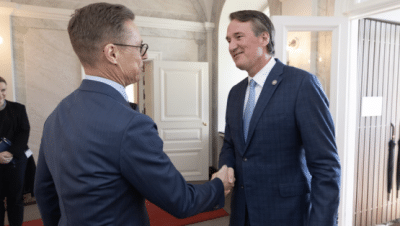
A retired judge is taking an extrajudicial approach to protect the identity of two alleged sexual-harassment victims of a member of the Augusta County Board of Supervisors who resigned his seat last year.
If, indeed, that is what Judge Thomas J. Wilson IV is doing here, protecting the alleged victims, and not what it seems he is actually doing here – protecting the Board of Supervisors.
Wilson, in a March 15 ruling, which was made public on Wednesday, took the unusual step of overstepping what even the Board of Supervisors had cited in the resolution that it used at its March 20, 2023, meeting to go into a closed session to discuss the resignation of Steven Morelli.
“The court is of the opinion that the subject matter of the audio recording contains information and statements that at times specifically identified county employees, and contained information and statements that would lead to a high probability of identification of county employees who are entitled to the privacy protection this exemption provides them,” Wilson wrote in the new ruling.
In this new ruling, Wilson effectively overturned his own Jan. 11 ruling in which he had ordered the county to hand over a digital copy of the recording of the March 20, 2023, closed meeting that had been made by Wayne District Supervisor Scott Seaton, and then turned over to the county, at the request of the Board of Supervisors, in August.
What’s particularly curious about the judge’s legal reasoning here is that the Board of Supervisors itself only referenced “Board of Supervisors” under the personnel exemption of the Virginia Freedom of Information Act in its resolution to go into closed session.
Wilson, in a Jan. 15 ruling, had already decided that the resolution was of the “general reference” variety, and thus had run afoul of a 2020 Virginia Supreme Court decision in Cole v. Smyth County Board of Supervisors.
In that case, the high court observed that the state’s FOIA law holds that “general reference to … the subject matter of the closed meeting shall not be sufficient,” and that “this prohibition against ‘general reference[s]’ is an implicit requirement that a motion effectively identify the subject matter to be discussed in the closed session. The Motions’ broad mention of ‘actual or probable litigation’ does not do so.”
That was what Wilson had ruled on in January – that the Board of Supervisors, by simply informing the public that it was going into closed session under FOIA’s personnel exemption to discuss “Board of Supervisors,” had lacked the necessary specificity required to be able to do so under state law.
So, it was curious that Wilson then allowed the county, at a Feb. 28 hearing that was supposed to focus on the award of attorneys’ fees to the plaintiff, Breaking Through Media, to present and argue a motion to reconsider, in effect giving the county’s legal team the opportunity to start the case over.
Wilson had ruled, in a separate case brought by AFP, that the recordings of the March 20, 2023, closed meeting, and other closed meetings recorded by Seaton, “having been turned over to the County, are now County public records and no longer the private property of Dr. Seaton.”
Here, Wilson was overturning an earlier ruling from Judge Rupen R. Shah, who in an Oct. 12 decision in the AFP case, which was heard in Augusta County General District Court, had declared that the recordings were not subject to FOIA because they were made by Seaton “for simply self-serving purpose,” and that they were “not a record of the agency nor is kept in a normal course of its business.”
Wilson’s new ruling backtracks on that point – again, rather curiously.
“In the normal course of events, there would be no record of the closed session,” Wilson wrote in his March 15 ruling. “Here, the same was surreptitiously recorded by Supervisor Seaton, though, and the County is now the holder of those recordings. In the end, the contents of the recording, reviewed in camera by the Court, establish that the closed session was an entirely appropriate personnel matter which should have been conducted in closed session, and the recording will not be provided to Petitioners.”
Here, it would appear that Wilson is using the brief discussion in the closed meeting of the two alleged sexual-harassment victims, who were at the time county employees, to make the entirety of the meeting undiscoverable, in spite of the fact that the Board of Supervisors itself did not seek, in its motion to go into closed session, to provide those protections to its employees, only to its discussions involving Morelli.
The 10 minutes of that hour-and-fifty-five-minute closed session that was about the two alleged victims isn’t the issue here; it’s the other hour forty-five in which the Board of Supervisors discussed Morelli that FOIA tells us should have been done in public, and since there’s a recording of what was discussed, now needs to be made public.










